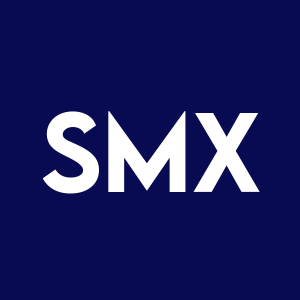SMX and Singapore's A*STAR Create World's First National Plastics Passport, Solving Recycling's Fatal Flaw (NASDAQ: SMX)
Rhea-AI Summary
SMX (NASDAQ:SMX) and Singapore's A*STAR have developed the world's first national plastics passport, addressing fundamental flaws in global recycling systems. The innovative solution embeds molecular-level markers directly into plastic materials, creating a digital tracking system that works across all polymer types.
The system solves three critical issues: geographical fragmentation of recycling standards, inconsistent auditing methods, and limited scope of recyclable materials. The technology enables continuous verification throughout the plastic lifecycle and expands beyond traditional PET recycling to include industrial polymers, automotive resins, and construction-grade plastics.
Singapore's implementation of this system is expected to influence the ASEAN region, representing a potential market worth over S$4.2 billion annually. The company's Plastic Cycle Token (PCT) adds financial incentives to the ecosystem.
Positive
- First-of-its-kind national plastics passport system with molecular-level verification
- Technology works across all polymer types, significantly expanding recyclable materials scope
- Potential market opportunity of S$4.2 billion annually in ASEAN region
- Partnership with Singapore's A*STAR adds credibility and government backing
- Integration of Plastic Cycle Token (PCT) creates financial incentives for recycling
Negative
- Implementation success depends on widespread adoption across jurisdictions
- Requires significant infrastructure and system changes to existing recycling frameworks
News Market Reaction
On the day this news was published, SMX gained 3.76%, reflecting a moderate positive market reaction. Argus tracked a peak move of +17.0% during that session. Our momentum scanner triggered 8 alerts that day, indicating moderate trading interest and price volatility. This price movement added approximately $64K to the company's valuation, bringing the market cap to $2M at that time.
Data tracked by StockTitan Argus on the day of publication.
NEW YORK, NY / ACCESS Newswire / September 11, 2025 / Recycling was supposed to be the easy win for sustainability. Policymakers set bold targets, global brands pledged billions, and NGOs pressed for accountability. Yet despite all that ambition, the results speak for themselves. Recycling rates remain stuck, plastics continue to pile up, and skepticism runs deep across the supply chain.
That gap between ambition and outcome is exactly what SMX (NASDAQ:SMX) and Singapore's A*STAR are solving with the world's first national plastics passport. By embedding proof at the molecular level, their system is designed to fix the very flaws that have undermined recycling for decades.
At the root of recycling's failure is not intent but structure. The frameworks built decades ago were designed too narrowly, audited too loosely, and fragmented by geography. The outcome was inevitable.
Fragmentation came first. Each country, and often each city, created its own patchwork of rules and collection standards. What qualifies as recycled content in one jurisdiction might not in another. The result is a global marketplace where no one can agree on what is credible, making it impossible for multinational brands to prove consistent compliance.
Inconsistent auditing followed. Most systems rely on paperwork, certifications, or periodic inspections. These are subjective, easy to manipulate, and incapable of providing continuous proof. When a brand says its packaging contains
The final flaw is scope. Recycling frameworks built around PET bottles and food-grade rPET were always destined to disappoint. PET accounts for only a fraction of global plastic use. The real volume sits in industrial polymers, automotive resins, electronics, textiles, and construction-grade plastics. By leaving those categories outside the system, recycling was guaranteed to remain an aspiration rather than a reality.
Taken together, these three flaws are not minor oversights. They are the fatal design features that explain why decades of effort have not produced the results policymakers and brands promised.
The Passport That Rebuilds the System
SMX enters the story not as another recycling company, but as the architect of a system designed to work. Its molecular-level marking technology, which creates a digital plastic passport for all types of plastics, fixes the very flaws that have kept recycling from becoming functional.
Instead of fragmenting, the plastics passport unifies. By embedding a molecular marker directly into materials, not applied after the fact, SMX creates a digital, in Singapore's case, national plastics passport, that can be scanned and trusted across borders. What makes these plastics passports so compelling is that, whether in Singapore, Europe, or the United States, the same verification and proof standards hold true. The fractured marketplace finally has a consistent standard. And the company's Plastic Cycle Token (PCT) adds financial incentives.
Instead of paper audits, the passport delivers proof. A polymer carrying an SMX marker can be tracked at every step of its lifecycle, from production through use to recycling and reuse. This continuous verification replaces subjective claims with objective evidence. Brands and regulators do not need to wait for quarterly disclosures or rely on audits that only sample small windows in time. Proof is present in the material itself.
All types. Instead of focusing nearly exclusively on PET or rPET, the SMX plastics passport expands coverage. SMX's markers work across all polymer types, from high-performance plastics in electronics to resins used in construction and automotive industries. That expansion changes the math entirely. Recycling can finally address the full plastics economy rather than a sliver of it.
By the way, it is no coincidence that Singapore has become the first country to implement this vision on a national scale. They have led in other markets, structurally changing some in the financial sector. By working with A*STAR and SMX to launch a plastics passport program, Singapore is leading again, this time transforming the idea of recycling from patchwork experiments into national infrastructure. That leadership is already influencing ASEAN, where the region can see a tangible pathway to replicate Singapore's framework into a market worth more than S
Why the Fix Matters Now
Those billions are the tip of the sustainability iceberg, making the stakes for getting this right never higher. Governments are under pressure to prove their environmental policies create a measurable impact. Brands are under pressure from consumers and investors to back up sustainability claims with real evidence. Financial markets are searching for companies that can turn compliance into value creation.
With SMX, plastics recycling shifts from aspiration to infrastructure. Waste becomes verified feedstock, compliance becomes a source of defensible value, and sustainability becomes measurable. For governments, this means accountability that functions across borders. For brands, it means proof that holds up to scrutiny. For stakeholders, it signals a company not simply aligned with a trend but positioned to own the architecture of a new system.
The fatal flaw in recycling was never ambition. It was design. Now, with an SMX plastics passport program built at the molecular level, the design itself has been fixed. Plastics recycling finally has the chance to work as promised, and SMX is the company making that historic correction possible.
References
National Environment Agency (NEA). Waste & Recycling Statistics 2014 - 2023. Singapore: NEA; 2024.
Shunpoly.com. "How Much Plastic Is Wasted Each Year in Singapore?" Accessed 5 August 2025.
National Environment Agency (NEA). Waste-Statistics & Overall Recycling (interactive dashboard). Updated 2024; accessed 5 August 2025.
National Environment Agency (NEA). Mandatory Packaging Reporting portal. Accessed 5 August 2025.
Singapore Statutes Online. Environmental Public Health (Public Cleansing) Regulations - Incineration gate-fee schedule; revised 2024.
National Environment Agency (NEA). "New Licensing Regime for General Waste Disposal Facilities." Technical brief & dialogue-session slides; 2024.
Nasdaq.com. "SMX Announces Planned Launch of World's First Plastic Cycle Token." Press release; 2024.
Yahoo! Finance. "SMX Plastic Cycle Token Is a Functional Market-Driven Solution…" News article; 2024.
Los Angeles Tribune. "Carbon Credits Had Their Day… Now the SMX Plastic Cycle Token…" Feature article; 2025.
National Environment Agency (NEA). Refuse Collection Fees for Households. Revised 2024; accessed 5 August 2025.
About SMX
As global businesses face new and complex challenges relating to carbon neutrality and meeting new governmental and regional regulations and standards, SMX is able to offer players along the value chain access to its marking, tracking, measuring and digital platform technology to transition more successfully to a low-carbon economy.
Forward-Looking Statements
The information in this press release includes "forward-looking statements" within the meaning of the Private Securities Litigation Reform Act of 1995. Forward-looking statements include, but are not limited to, statements regarding expectations, hopes, beliefs, intentions or strategies regarding the future. In addition, any statements that refer to projections, forecasts or other characterizations of future events or circumstances, including any underlying assumptions, are forward-looking statements. The words "anticipate," "believe," "contemplate," "continue," "could," "estimate," "expect," "forecast," "intends," "may," "will," "might," "plan," "possible," "potential," "predict," "project," "should," "would" and similar expressions may identify forward-looking statements, but the absence of these words does not mean that a statement is not forward-looking. Forward-looking statements in this press release may include, for example: matters relating to the Company's fight against abusive and possibly illegal trading tactics against the Company's stock; successful launch and implementation of SMX's joint projects with manufacturers and other supply chain participants of gold, steel, rubber and other materials; changes in SMX's strategy, future operations, financial position, estimated revenues and losses, projected costs, prospects and plans; SMX's ability to develop and launch new products and services, including its planned Plastic Cycle Token; SMX's ability to successfully and efficiently integrate future expansion plans and opportunities; SMX's ability to grow its business in a cost-effective manner; SMX's product development timeline and estimated research and development costs; the implementation, market acceptance and success of SMX's business model; developments and projections relating to SMX's competitors and industry; and SMX's approach and goals with respect to technology. These forward-looking statements are based on information available as of the date of this press release, and current expectations, forecasts and assumptions, and involve a number of judgments, risks and uncertainties. Accordingly, forward-looking statements should not be relied upon as representing views as of any subsequent date, and no obligation is undertaken to update forward-looking statements to reflect events or circumstances after the date they were made, whether as a result of new information, future events or otherwise, except as may be required under applicable securities laws. As a result of a number of known and unknown risks and uncertainties, actual results or performance may be materially different from those expressed or implied by these forward-looking statements. Some factors that could cause actual results to differ include: the ability to maintain the listing of the Company's shares on Nasdaq; changes in applicable laws or regulations; any lingering effects of the COVID-19 pandemic on SMX's business; the ability to implement business plans, forecasts, and other expectations, and identify and realize additional opportunities; the risk of downturns and the possibility of rapid change in the highly competitive industry in which SMX operates; the risk that SMX and its current and future collaborators are unable to successfully develop and commercialize SMX's products or services, or experience significant delays in doing so; the risk that the Company may never achieve or sustain profitability; the risk that the Company will need to raise additional capital to execute its business plan, which may not be available on acceptable terms or at all; the risk that the Company experiences difficulties in managing its growth and expanding operations; the risk that third-party suppliers and manufacturers are not able to fully and timely meet their obligations; the risk that SMX is unable to secure or protect its intellectual property; the possibility that SMX may be adversely affected by other economic, business, and/or competitive factors; and other risks and uncertainties described in SMX's filings from time to time with the Securities and Exchange Commission.
EMAIL: info@securitymattersltd.com
SOURCE: SMX (Security Matters) Public Limited
View the original press release on ACCESS Newswire







